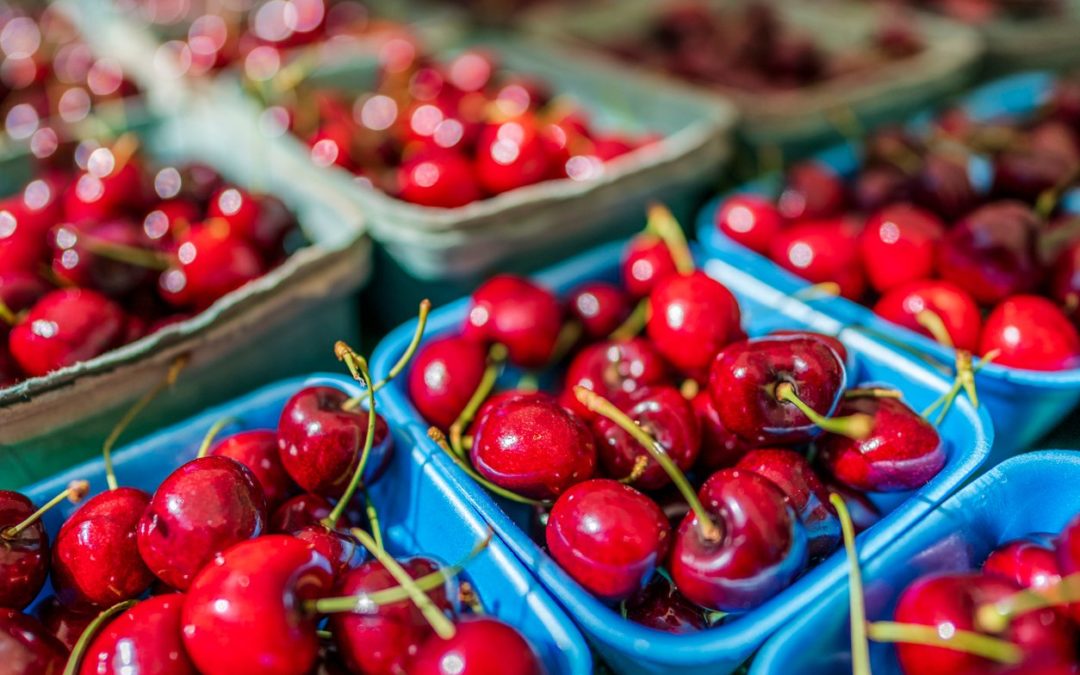Sleep. It’s something we all need, but we can’t seem to get enough of it. Between the busy-ness of our everyday lives and the pandemic, many of us treat sleep as a luxury, not a necessity.
When we think about healthy living, diet and exercise are the first things that come to mind. And sleep … well, that tends to get pushed down on the priority list. But when we don’t get enough shut-eye, it has a negative ripple effect on all aspects of our lives: Less energy, more stress, the list goes on and on.
Ever heard the saying, “you are what you eat?” While we know unhealthy eating habits show in our waistlines, what you eat also affects how well you sleep. And science confirms it: According to research, one of the best ways to improve sleep quality is through a healthy diet.
Here are 20 expert-approved foods to help you fall (and stay) asleep.
Foods that help you sleep
Cherries
Eating cherries has been directly linked to longer and higher quality sleep.
“Cherries have been known to fight insomnia and promote a better night’s sleep,” said Dr. Lior Lewensztain, Founder and CEO of That’s it. Nutrition. “This popular fruit naturally contains tryptophan and anthocyanine, two compounds that aid the body in producing melatonin, the hormone responsible for regulating the sleep cycle.”
Milk
When we eat food high in sugar and fat, the tissues in the throat and sinuses swells and enlarges as an effect. This ultimately increases the incidence of both sleep apnea and snoring. To help eliminate this, Dr. Gan Eng Cern, a physician and ENT surgeon who specializes in sleep conditions including snoring and Obstructive Sleep Apnea (OSA), recommends drinking milk before bed.
Milk is rich in both tryptophan and calcium. Tryptophan is an amino acid that helps the body’s production of serotonin.
“Serotonin induces deeper and more restful sleep by creating melatonin, the hormone responsible for sleep-wake cycles,” Dr. Cern. “Milk also helps maintain your calcium levels at night which keeps you asleep for a more quality rest. It may also be the routine of drinking milk that helps you fall asleep—an established regular bedtime routine helps induce sleep efficiently for most people.”
Oatmeal
Dina Totosegis, RD and Founder of Sprouting Foodies recommends a warm bowl of oatmeal, which can be a very soothing snack before bedtime.
“Oats contain tryptophan which the brain converts into serotonin and used to produce melatonin, the sleep-inducing hormone,” Totosegis explains. “They also are a great source of complex carbohydrates, which help regulate our blood sugar and cortisol levels simultaneously promoting longer, more restful sleep.”
Fish
There are several nutrients in fish—specifically omega-3s and vitamins B-6 and D—that may impact our sleep. Omega-3s and vitamin D found in fatty fish—like salmon, tuna and sardines—may help improve sleep quality and quantity in adults and children.
“The omega-3 DHA may boost better sleep by helping stimulate the hormone melatonin, a key hormone for promoting sleepiness,” says Rima Kleiner, MS, RD. “Vitamin D may help support a healthy circadian rhythm, which helps us feel sleepy at nighttime and alert during the day. And, vitamin B-6 also helps aid in the production of melatonin and serotonin, both of which help promote more restful sleep.”
Kleiner suggests eating 2-3 servings of a variety of fish—including salmon, tuna, shrimp, halibut and sardines—every week.
Pro tip: for optimal nutrition, focus on healthful cooking methods, like grilling, baking, roasting, poaching and broiling, she adds.
Nuts
Almonds and walnuts in particular can help improve sleep quality.
“Both of these types of nuts are rich in melatonin, a hormone that regulates our internal bodily clock and signals to the body when it’s time to prepare for sleep,” says Kristin Gillespie, MS, RD, Registered Dietitian and Certified Nutrition Support Clinician.
Bananas
While being high in potassium, bananas are also high in tryptophan and magnesium. “Magnesium helps to relax muscles, which translates into better sleep,” says Dr. Christine Bishara, MD, and Founder of From Within Medical. “Many people, especially women, suffer from muscle cramps or restless legs during the night which can interfere with sleep. A magnesium deficiency could be the cause of this. A banana a few hours before bedtime can help.”
Pumpkin seeds
Another magnesium-packed food is pumpkin—especially the seeds!
“As a rich source of calming magnesium, pumpkin seeds are an easy evening snack,” Dr. Stacie Stephenson, certified nutrition specialist and founder of VibrantDoc, explains. One ounce of seeds contains 150 mg of magnesium.
Turkey
While we assumed overeating was the main cause of the Thanksgiving food coma, turkey may actually be the culprit.
“Turkey is well-known for inducing sleep following this holiday meal,” says Gillespie. “This is because turkey contains tryptophan, an amino acid which stimulates increased production of melatonin.”
Eggs
Eggs are more than a breakfast staple.
“Because they are high in protein, they help you stay full longer, but are also high in melatonin and tryptophan,” says Dr. Bishara. “In general, you don’t want to eat four hours before you sleep but eating a hard-boiled egg as an early evening snack might be a great way to get a good night’s sleep.”
Carbs
Some people eating a low-carb diet may find it interferes with sleep, Stephenson explains. Research shows that a high-carbohydrate meal about four hours before bedtime significantly decreased the time it took to fall asleep.
Chamomile tea
Your grandma was right! A nice warm cup of chamomile tea before bedtime can help you wind down, relax, and get a better night’s sleep, according to Dr. Phoenyx Austin, M.D., founder of drphoenyx.com, nutrition specialist.
Here’s why: Studies show that chamomile contains unique antioxidants like apigenin which has been shown to bind to brain receptors that promote sleepiness and improve sleep quality. Another study showed that adults who consumed chamomile fell asleep faster and experienced less nighttime wakening compared to those who didn’t.
Mangos
This nutrient-rich fruit packs a powerful punch when it comes to improving sleep.
“Mangos contain vitamins B6 and B12, magnesium and potassium, all of which help to keep your body’s circadian rhythm in check,” says Dr. Chad Walding DPT, co-founder of NativePath, a doctor of physical therapy, and sports nutrition specialist.
“Vitamin B6 increases your body’s production of melatonin to regulate your body’s sleep/wake cycle. Magnesium reduces your nerve activity and relaxes muscles so that you can have a more restful sleep.”
Avocados
Avocado is high in fiber and fat, two nutrients that help stabilize blood sugar and promote restful sleep. “Fat before bed is a good way to ensure your body can make it through the fasted state of sleep,” Alicia Galvin, RD, Resident Dietitian for Sovereign Laboratories, explains. “It prevents blood sugar from dropping too low and triggering you to wake up.
Beans and pulses
Fava beans, chickpeas, and lentils are rich in tryptophan and magnesium.
“There are many ready to eat, delicious foods that contain beans and pulses,” says Jenna Gorham, RD, LN of The RD LINK. “Bada Bean Bada Boom crunchy bean snacks are an easy low sugar, high fiber snack of roasted and seasoned fava beans. Chickpea pasta and Right Rice are also both legume-based (chickpeas and lentils) and easy to prepare.”
A small bowl of cold cereal or warm muesli
As mentioned above, milk is great for sleep. However, Gorham explains it’s not just about the milk! “Be sure to choose a low or no added sugar and complex carb cereal or muesli, like Seven Sundays Sunflower Cereal and Muesli mixes, to prevent a spike in your blood sugar and boost in energy,” says Gorham. “Simple carbs (like sugar) can actually reduce serotonin and make you feel awake. Seven Sundays Mueslis are oat and nut based which may also help to promote sleep.”
Valerian root tea
Valerian root is one of the best herbs for promoting sound sleep. “It contains compounds that interact with gamma-aminobutyric acid (GABA), a chemical messenger that helps regulate nerve impulses in your brain and nervous system,” says Jordan Dorn, Certified Nutritionist and Co-Founder of Zuma Nutrition. “Low GABA levels related to acute and chronic stress are linked to anxiety and low-quality sleep.”
Hops
Humulus lupulus, commonly referred to as hops, is a component of beer with sedating properties. “The bitter resins in the hops plant increase activity of the calming neurotransmitter GABA,” says Dr. Melinda Ring, MD, executive director of The Osher Center for Integrative Medicine at Northwestern University. “While alcohol can interfere with sleep quality, use of a non-alcoholic beer with dinner may potentially help sleep quality based on a few positive studies.”
Spinach
This nutritious veggie contains tryptophan to promote sleep. Gorham recommends a green smoothie with Greek yogurt or milk and a small spoonful of almond butter – it’s a great snack before you go to sleep.
Tulsi Tea
As an adaptogenic herb, tulsi helps reduce stress and promote health.“Adaptogenic herbs help the body adapt to stress by creating balance in the body’s hormones,” explains Dorn. “This can also impact hormones that may be responsible for insomnia.”
Watermelon
This fruit is a great choice because of the water and fiber content. “Watermelon will help to hydrate you and fill you up without leaving you too full,” says Gorham.
Sources
· Lior Lewensztain, Founder and CEO of That’s it. Nutrition
· Gan Eng Cern, Physician and Ear, Nose and Throat surgeon
· Dina Totosegis, RD and Founder of Sprouting Foodies
· Rima Kleiner, MS, RD
· Kristin Gillespie, MS, RD, Registered Dietitian and Certified Nutrition Support Clinician
· PubMed: Melatonin in Walnuts: Influence on Levels of Melatonin and Total Antioxidant Activity
· Christine Bishara, MD, and Founder of From Within Medical
· Stacie Stephenson, certified nutrition specialist and founder of VibrantDoc
· The American Journal of Clinical Nutrition: High glycemic index carbohydrate meals shorten sleep onset
· Phoenyx Austin, M.D. is the founder of drphoenyx.com, nutrition specialist and wellness entrepreneur
· PubMed: “The Therapeutic Potential of Apigenin”
· PubMed: “Preliminary Examination of the Efficacy and Safety of a Standardized Chamomile Extract for Chronic Primary Insomnia”
· Chad Walding DPT, co-founder of NativePath, a doctor of physical therapy, a holistic health coach, and is an ISSA Specialist in Sports Nutrition
· Alicia Galvin, RD, Resident Dietitian for Sovereign Laboratories
· Jenna Gorham, RD, LN of The RD LINK
· Jordan Dorn, Certified Nutritionist and Co-Founder of Zuma Nutrition
· Melinda Ring, Executive Director of The Osher Center for Integrative Medicine at Northwestern University


